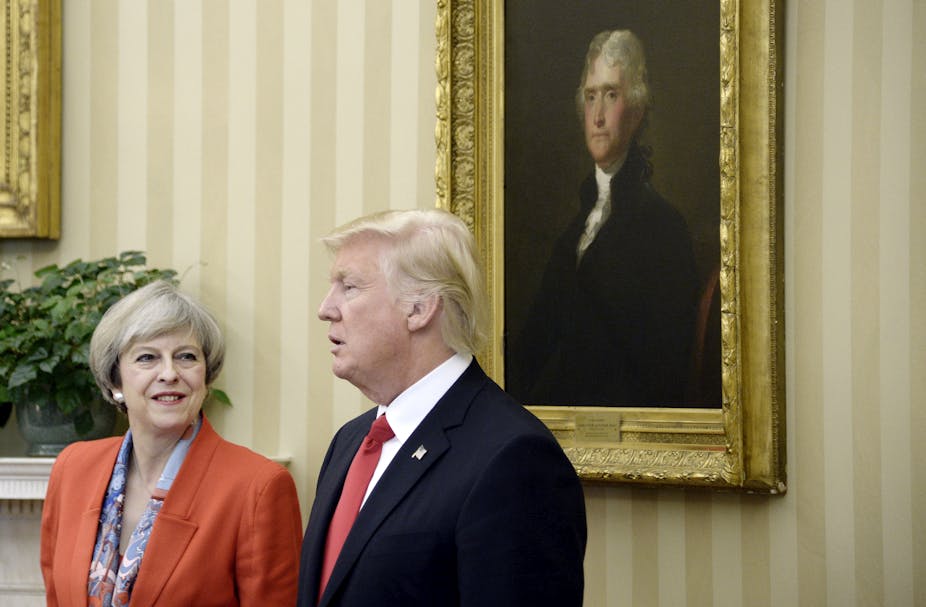It was not supposed to be like this. The broad grin on Theresa May’s face as she strode around the White House hand-in-hand with Donald Trump betrayed the delight the British prime minister clearly felt at being the first foreign leader to be invited to an audience with the new American president. The message from Downing Street was that May’s visit symbolised the UK’s commitment to the much-fabled “special relationship” with the United States. To top it all, an invitation for an official state visit to the UK was very publicly extended to Trump, and accepted.
Fast-forward a few days and May is under increasingly intense political pressure to distance the British government from the Trump administration. Before May’s plane had even left American soil, Donald Trump had signed an executive order banning citizens from seven predominantly Muslim countries from entering the United States, and placing a blanket ban on granting asylum to refugees.
Asked repeatedly to condemn Trump’s move during her next stop in Turkey, May dodged the issue. She simply stated that “the United States is responsible for the United States’ policy on refugees”. On her return to London, as global fury gathered pace in response to Trump’s actions, the best May could manage was a meek official statement (delivered in the middle of the night) clarifying that the British government did “not agree” with Trump’s travel ban.
Neither this, nor Boris Johnson’s vague assurance that British citizens will not be affected by the measures, have proved enough to quell the growing anger. Monday saw protests against Trump’s travel ban throughout the UK, including one of over 10,000 people in London.
Home secretary Amber Rudd used stronger language in a statement to MPs shortly afterwards, describing Trump’s travel ban as divisive and wrong. But this has done little to stem the growing wave of anger at the lacklustre response from the government.
The anger has been channelled into a call to cancel the state visit, with an online petition to this end having generated in excess of a million signatures in less than 36 hours after May issued the invitation. May is holding firm, claiming that to cancel the planned visit would undo all the good work in strengthening the special relationship achieved by her trip to Washington.
Time to take a stand
Clearly there are pragmatic reasons for the UK to maintain a strong working relationship with the US, regardless of who the American people choose to elect as president. Trade with the US is important for Britain and the United States is the largest source of foreign direct investment into the United Kingdom.
The economic relationship with the US is likely to become more important for Britain as the country exits the European Union. Similarly, intelligence cooperation between the two countries has been extensive for many years. And while we now know (thanks to Edward Snowden) that this form of intelligence sharing is open to abuse, it can also be vital in protecting the UK against terrorist and other threats.
But May’s gushing attitude towards Trump during her Washington trip went much further than was needed to maintain the core elements of the UK’s relationship with the United States.

Having expressed her desire to form a close personal relationship with Donald Trump, May declared a determination to work alongside the Trump administration in leading the world together to promote the two countries’ shared values. With a president in the White House who has openly mocked disabled people, boasted about sexually assaulting women, and used his first week in office to confirm his intention to build a wall along the Mexican border, people are quite reasonably asking exactly what shared values May has in mind. Her pledge to work with Trump to “deliver on the promises of freedom and prosperity” in this context is patently absurd.
The state visit promised to Trump means an invitation to Buckingham Palace with all the pomp and ceremony that implies. As May deals with the increasingly toxic political fallout from this move, she faces a quandary entirely of her own making. That the offer of a state visit to Trump would incite such opposition was entirely predictable. The new occupant of the White House had made his intentions clear on torture, immigration and the wall long before taking office.
Commentators such as the former Foreign Office mandarin, Lord Ricketts, counsel that the controversy around Trump will fade as the new administration finds its feet. That could allow May to postpone any state visit to a later date and a more politically hospitable climate. She could receive him without letting him see the Queen in the meantime. But the evidence of Trump’s first week in office suggests that such an optimistic outlook is based on wishful thinking.
Trump ran for office on a platform of misogyny, racism and bigotry. It is increasingly clear that it is on this basis that he will govern. There may never be a political climate hospitable enough to make a state visit acceptable from this president.
The British government needs to make a decision whether to support or oppose the Trump administration. The middle ground it seeks is disappearing with every executive order signed. To paraphrase a former American president: you are either with Trump or against him.

